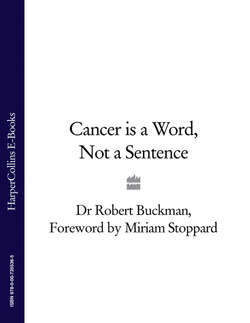Cancer is a Word, Not a Sentence

Реклама. ООО «ЛитРес», ИНН: 7719571260.
Оглавление
Miriam Stoppard. Cancer is a Word, Not a Sentence
Cancer is a word, not a sentence. Dr Robert Buckman. Foreword by Dr Miriam Stoppard
Table of Contents
Foreword
INTRODUCTION A word, not a sentence
PART ONE ‘What’s going to happen to me next?’
Cancer or the cancers? a big difference
‘Cancer’ as compared to ‘infection’
The cancer process
The ways in which a first diagnosis is made
A brief guide to the tissue diagnosis
What next?
The two questions that are most commonly asked
The principles of staging tests
The most common types of tests
Treatment: is there a ‘best kind?’
Surgery
Radiotherapy (radiation oncology)
Chemotherapy
Biological therapy (including hormone therapy)
Treatment options—when can you choose?
Balancing potential benefits against potential risks
The risk benefit analysis—a quick checklist
The seven main types of treatment plans
First, where cure or long-term control is not likely, but medium—or short-term control is very likely
Second, where long-term control is unlikely, and medium—or short-term control is possible but not very likely
First, where are the metastases, and what trouble are they likely to cause you in the near future?
Second, what are the treatment options for treating the metastases? And is the chance of achieving a remission high or low?
Third, what are the likely or expected side effects from the treatment?
Combining several approaches
‘When can I say I’m cured?’
WHAT A 60 PER CENT RESPONSE RATE ACTUALLY MEANS: A QUICK POINT ABOUT STATISTICS
‘Why can’t I have a test to tell me if there’s going to be a problem?’
WORRYING ABOUT THE FOLLOW-UP VISITS
The R.A.C.E strategy for reducing anxiety
‘Is recurrence “game over”?’
When should you find out what the next options are?
PART TWO ‘What’s treatment like?’
‘How does surgery work?’
‘What is surgery like?’
Surgical operations for staging the cancer
‘What side effects can I expect?’
‘What about long-term effects?’
‘What does it mean when the doctor says “We got it all”?’
When surgery is not an option: ‘Why can’t they try an Operation anyway?’
Common myth: ‘If the air gets to the cancer, it will spread’
‘How does radiotherapy work?’
Understanding planning: ‘What’s the first visit like?’
‘What is the treatment like?’
‘What side effects can I expect?’
‘What about long-term effects?’
Common myth: radiation damages the immune system and does more harm than good
‘How does chemotherapy work?’
Chemotherapy drugs and the growth of cells
‘What is chemotherapy like?’
‘What side effects can I expect?’
Side effects that happen with most chemotherapy drugs
Side effects that happen only with particular chemotherapy drugs
High-dose therapy with bone marrow rescue, bone marrow transplant, or stem cell rescue
‘What are the long term effects?’
‘How do biological agents work?’
BIOLOGICAL THERAPY AS AN ADJUNCT TO OTHER CANCER TREATMENTS
Getting to know your team members
‘Who are you and what do you do?’
Talking about your symptoms
Asking for information
Getting a second opinion
PART THREE ‘Isn’t there an easier way?’
‘So what’s the problem with unfounded claims?’
The upside of complementary medicine
Possible explanations of apparently inexplicable miracles
‘Can’t I try complementary medicines anyway?’
PART FOUR ‘How do I get back on track?’
Surviving versus thriving
First things first: some general guidelines
‘What good does talking do?’
Talking with friends and family (tips for the person with a cancer diagnosis)
Talking with the person with a cancer diagnosis (tips for friends and family)
The S.C.A.N.S mnemonic: an aide-mémoire for effective listening
‘What is spirituality and how do I know how important it is to me?’
Transcendence: the essence of spiritual experience
‘Whom should I talk to?’
‘What should I do?’
Bad religiosity
‘Does intercessionary prayer change the course of a disease?’
Sex as antidote
The many sources of difficulty
The taboos
Getting sex started again
‘What is hope anyway?’
Things we all hope for
PART FIVE ‘Do I always have to have a positive attitude?’
Attitude, illness and history
Coping with the unintelligible
‘Why do so many people believe you cause your own cancer?’
‘That makes sense’: the power of individual stories
Set thinking
Stress and the recurrence of cancers: some facts
Depression
The verdict: stress doesn’t cause cancers
The Bottom Line: Blaming the Patient
PART SIX ‘What can I do to help myself?’
The ‘You Are Here’ sticker
Friends
Support groups
The internet
APPENDIX I
APPENDIX II ‘Where can I get more help?’
Cancerbackup
Cancer Research UK
CLIC Sargent
The Institute of Cancer Research
Macmillan Cancer Support
NHS Direct
The Royal Marsden Hospital
Further reading
Index
Acknowledgements
Author’s note
Copyright
About the Publisher
Отрывок из книги
With Major Contributions by Dr Pamela Catton and the Medical Staff of the Princess Margaret Hospital,Toronto, Ontario
—DR JUDAH FOLKMAN
.....
‘Do I actually need all these tests?’
Staging tests are, according to some, ‘the insult that is added to the injury’. Often, they seem to do no more than delay getting the treatment started. But they do matter, and this section explains why.
.....